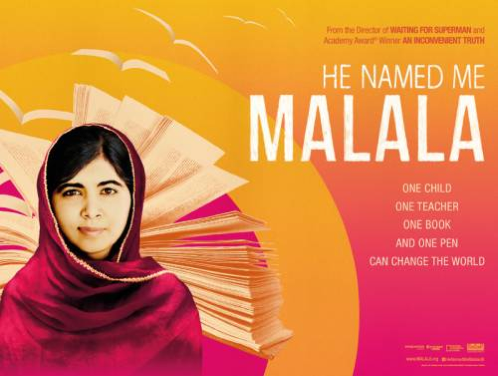
Imagine an Afghan Joan of Arc and you’ve got an idea of the fire-breathing character of the heroine after whom the star of He named me Malala is named. In the face of disillusionment and low morale in the Afghan army Malala is said to have rallied the Afghan troops to repel the British in the 19th century Battle of Maiwand. (Yes, Sherlockians, that is the very skirmish in which Dr Watson was injured).

This documentary tells the story of a father and the young girl he named after that feisty patriot. This Malala Yousafzai lives in Taliban controlled Pakistan and though she is still a teenager she has taken on a similar role as her namesake – pushing for change and improved attitudes in the region. She found fame when she survived a bullet fired at her head by a Taliban soldier whilst on a school bus. Why had she been attacked? The film does not make the particulars clear. In general it was because she was a girl going to school and the Taliban have banned girls from receiving education, but there were other girls on the bus and Malala seems to have been specifically targeted. There is also no explanation of why a girl shot on a bus in Taliban-controlled Pakistan was transferred to England for treatment, which was ultimately successful. The nerves in one side of her face don’t work as before and her lip droops slightly, but given that she was shot in the head it is an amazing recovery – although she does persist with a headscarf which may be hiding more obvious injures.
It would have been helpful if the film had made it clear how and why she was transferred to the UK. Possibly it has something to do with an anonymous blog she had been writing for the BBC. Her father – who runs local schools – had asked her if she wanted to do it. But he must have known – just as all the viewers of this film quickly realise – that she was bound to say yes to such an offer. Twice in the film he ponders whether he should blame himself for any of what has happened to her. His tone suggests he believes he shouldn’t but as an outsider it is hard not to disagree with that conclusion. Malala’s concerns are valid and important, but they are very obviously her father’s concerns, focusing as they do on education. She still covers her hair and hasn’t yet rebelled against the oppressive control over women’s clothes which she appears to accept.
The coverage her attack has had in the world media has allowed the articulate youngster to speak out about human rights and the need for women to receive education. Now she lives a life of international travel. We see her with Hilary Clinton, Obama, Bono, Gordon Brown (there’s an accent I didn’t expect to hear in a documentary about a Pakistani girl) and several pop stars I didn’t recognise.
But its name embodies the difficulty with this documentary. He named me Malala focuses attention on Malala’s father rather than the girl herself. She has been thrust onto the political stage, is clearly an excellent speaker and has thrived on the attention. But he is a constant presence, in the film and travelling with his daughter around the world. He seems much more upset than she when she does not win a Nobel Prize and it is hard not to see him as a competitive dad enjoying vicariously the hard work and fame of his daughter.
Amongst the usual interviews, shots of family life, and archive footage, animations are becoming common in documentaries. This is no exception, using wispy images to illustrate parts of the story. In her brother’s words Malala is ‘addicted to books.’ There is a brief attempt to depict a normal life – we see her telling of her favourite books, fighting with her brothers and studying at school. But her life is not that of a normal teenager – we also see her speaking to the UN and bringing attention to the Syrian refugee crisis.
The film is a portrait of a brave girl and a driven father. Malala has lost out on childhood through all her charity work – something she may come to regret and for which she may blame her father. But the film demonstrates the shocking problem of 15th century attitudes in the 21st century. Florence’s famous Bonfire of the Vanities took place in 1497. Over five hundred years later Pakistanis are still suffering the same extreme persecution that Europeans eradicated centuries ago. Replace Savonarola with the Taliban and paintings and books with DVDs and TVs and the similarities are inescapable. Unfortunately here the alternative to the Taliban – though a vast improvement – is still a patriarchal system without true freedom for women.
In cinemas from November 6th

Leave a Reply